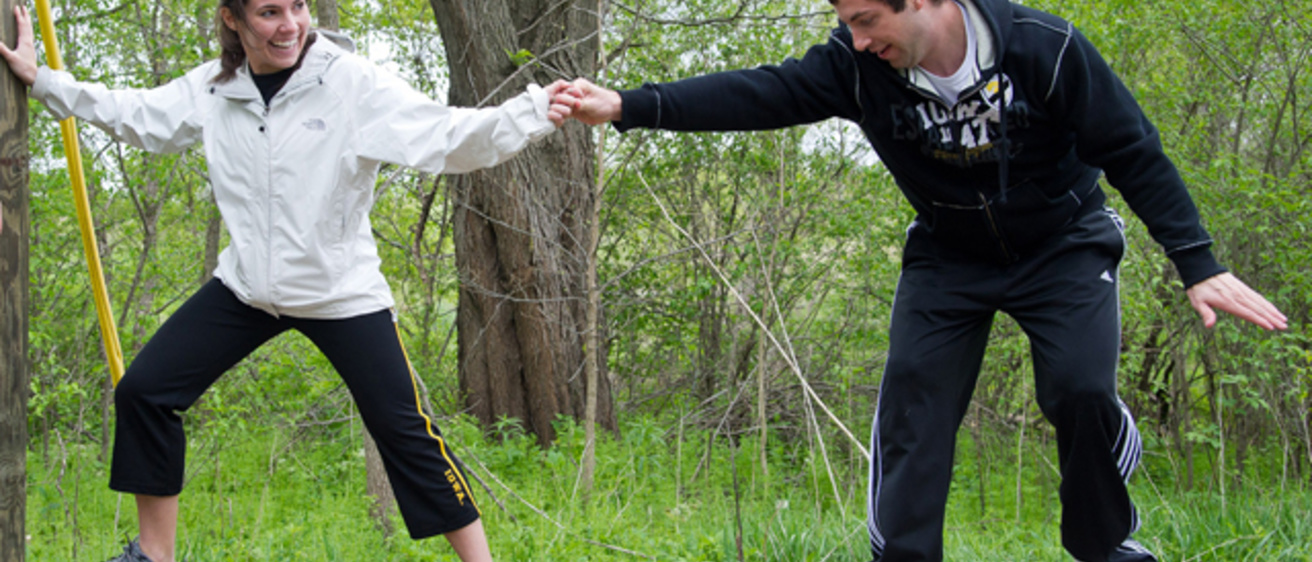Katelyn Kotek imagined she’d be a “helper,” facilitating activities for a group of disabled learners when she signed up to participate in a College of Education-sponsored workshop at the University of Iowa’s High Adventure Challenge Course last spring.
“I thought we’d be assisting them, helping them have a cool experience, but instead it was more of an experience for all of us,” she says. “We were all stretching ourselves, all trying something new, and all forced to trust and depend on each other to reach a goal we were all trying to accomplish.”
Kotek, a junior elementary education major, was part of a group composed of pre-service teachers and students enrolled in the College of Education’s REACH program for students with intellectual and learning disabilities. They gathered at the low ropes course for an exercise in teamwork and problem solving, but came away with even bigger lessons and rewards.
The High Adventure Challenge Course, part of UI Recreation and Wellness, offers challenges that rely on teamwork and problem solving to complete—such as moving every member of a group from a starting point to an end point over cables connected to poles at varying distances and levels of stability.
Jay Gorsh, a special education doctoral student, works at the course and organized the College of Education visit last spring. The visit, funded in part through a College of Education graduate student research grant, served as a pilot study of incorporating these types of experiences into classroom teaching. Gorsh will lead another low ropes course experience for teacher education and REACH students Sept. 21.
Kotek described one activity where every member of the group had to move, without touching, through a spider web of rope and with each member going through a different hole. By the time it was her turn, the only remaining holes were up high and she’d never make it through on her own. She had to rely on a REACH student to lift her up and put her through.
“It was weird to totally put yourself out there and trust someone, but we bonded and worked well together,” she says, noting that the experience changed the way she hopes she’ll work with her future students.
“The kind of relationship we had on the ropes course is the kind I want to have in my classroom,” she says. “I want to develop that rapport, an atmosphere like that.”
Gorsh says he hopes the experience taught pre-service teachers not to underestimate any student, but to challenge and hold high expectations for all.
REACH students took away their own rewards as well.
REACH, an acronym for Realizing Education and Career Hopes, is a two-year certificate program that provides a campus experience empowering young adults to become independent, engaged members of the community. The ropes course offered them a chance to have positive interactions with fellow UI students as well as increase their confidence in their ability to problem solve and socialize with people outside of their usual social group.
“I’m hoping that if we create this type of experience, it will help give them a little more confidence to branch out and try other activities and have more opportunities to interact with their peers,” Gorsh says.
Gorsh will present methods used in this experience for the first time at the Council for Exceptional Children’s Teacher Education Division’s conference in Michigan in November and says he hopes to gain approval to collect data to support the lessons learned in last spring’s event.
Teacher education students who participated in the event, and who will participate Sept. 21, are working toward their Teacher Leader Certificate, a series of experiences and competencies in assessment, technology, and community engagement to encourage strong classroom leadership skills.
To learn more about the College of Education’s Teacher Leader Certificate or to find out how to participate in the Sept. 21 event, visit www.education.uiowa.edu/services/tlc. To learn more about majoring in special education, visit www.education.uiowa.edu/teach/special-education. To learn more about the High Adventure Challenge Course, visit recserv.uiowa.edu/Apps/Facilities/ChallengeCourse.aspx.
